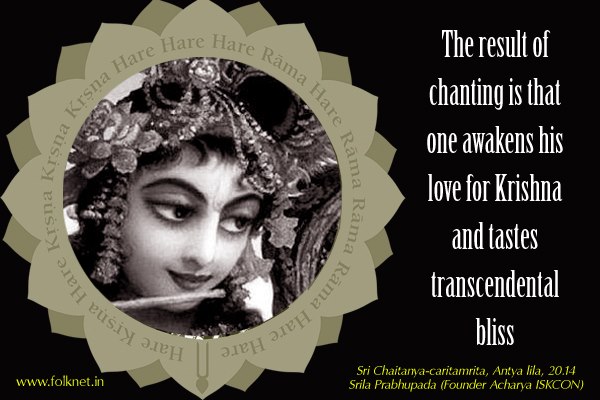
Prabhupada, Vrndavana, September 5, 1975: […] Therefore when a devotee suffers, he does not take it illy. He thinks that, “I am being purified. I am being purified.”
tat te ’nukampam su-samiksamano bhunjana evatma-krtam vipakam hrd-vag-vapurbhir vidadhan namas te jiveta yo mukti-pade sa daya-bhak
A devotee, when he is in troubled condition, he thinks, “My Lord is so kind that He is purifying me. I am suffering from my past misdeeds. So Krishna is so kind that He is purifying me, giving me little suffering. That’s all right. Therefore I must be obliged to Him.” And he offers more respectful obeisances to the Lord: “My Lord, You are purifying me.” If one lives like this, mukti-pade sa daya-bhak, his liberation is guaranteed.
Daya-bhak. Daya-bhak means just like the son inherits the father’s property without any check. Nobody can check. Law is there—“The father’s property must be inherited by the son.” Similarly, those who are strictly in Krsna consciousness despite all kinds of hindrances, his liberation is guaranteed. His liberation is guaranteed. And if he becomes little, immediately disturbed with little inconvenience, and “What is this nonsense, Krsna conciousness…? Give it up. Let me enjoy,” then he is again in the clutches of maya.
So we should be very careful to stick to Krsna consciousness without being agitated or deviated in any circumstances of life. Then we will not be liable to the punishment of Yamadata. That is the incident happening here. Slightly he became Krsna conscious at the end of life and chanted “Narayana”—immediately the Visnu, Bhagavad-duta came: “Oh, he has chanted Hare Krsna mantra. That’s all right. Let him take back home, back to Godhead.”
Thank you very much. (end)
Prabhupada, Bombay, November 23, 1974: […] So the devotee sometimes welcomes suffering because that is an opportunity of remembering Krishna very constantly. Tat te ’nukampam su-samiksamano bhunjana evatma-krtam vipakam. So when a devotee suffers, he thinks that “It is due to my past misdeeds. So I am suffering not very much, a very little, on account of Krishna’s grace. So it doesn’t matter.” So after all, it is, everything, in the mind, suffering and enjoying. So a devotee’s mind is trained up in Krishna consciousness. Therefore he does not care for suffering. That is the difference between a devotee and nondevotee.
Therefore it is said that tapanti vividhas tapa na etan mad-gata- cetasah. Just like Prahlada Maharaja. So how much suffering he had to undergo, the five-years-old boy, and his father was putting in dangers, sometimes under the feet, leg of the elephant, sometimes throwing from the mountain, sometimes on burning oil, sometimes amongst the snakes, so many ways. But he was silent. Haridasa Thakura. Haridasa Thakura was a Muhammadan by birth. So he became a very good devotee and always chanting Hare Krishna. That was his fault. So the Muslim Kazi called him, that “You are Muhammadan. You born in a such great family, Muhammadan family, and you are chanting Hindu’s Hare Krishna mantra? What is this?” So he mildly replied, “My dear sir, there are many Hindus, they also have become Muhammadan. So suppose I have become Hindu. So what is the wrong? What is the wrong there?” So Kazi became very angry, that “You are talking before me? All right.” So he was punished to be caned in twenty-two bazaar, in front of twenty-two bazaar. That means he was to be killed by caning. So it is understood, when he was beaten by the cane, Caitanya Mahaprabhu was on his back. So he did not feel any suffering. So there are many instances. A devotee had to suffer many sufferings, but they did not take it very much severely. They tolerated. And a devotee is educated to tolerate.
Therefore, in the sadhu’s symptoms, beginning, that titiksavah karunikah, they, a devotee, suffers; at the same time, he is very kind to these conditioned soul, how to elevate them, how to make them Krishna conscious. This is karunikah. These are the very primary features of a devotee’s life. People put him into suffering in so many ways, but he does not give up his job. His job is to spread Krishna consciousness so that others may become happy. Just like Prahlada Maharaja said, “My Lord, I have no suffering. I have no suffering because I know the art, how to become happy.” Tvad-virya-gayana- mahamrta-magna-cittah. The same thing is described here: srnvanti kathayanti. So Prahlada Maharaja said that “I know how to become happy.” How to become happy? “Now, simply hearing about You and chanting about You, that’s all.” Srnvanti kathayanti. Just like here two business is going on: you are hearing, and I am speaking. Bodhayantah parasparam. Mahatmanas tu mam partha daivim prakrtim asritah, bhajanti [Bg. 9.13] This bhajana means srnvanti kathayanti. Sravanam kirtanam visnoh [SB 7.5.23]—this is bhajana. You simply hear about the Lord, you talk about the Lord.







Speak Your Mind